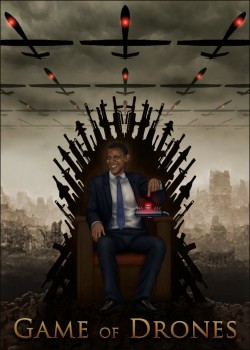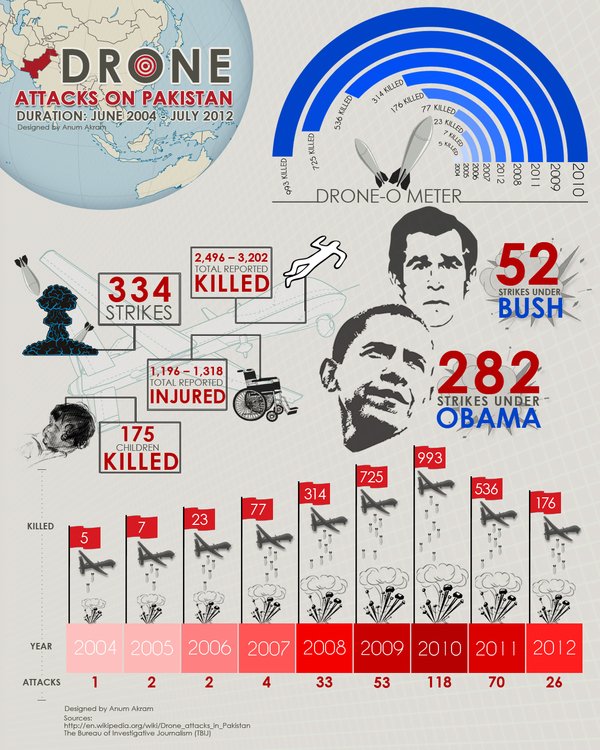PHILLY BURBS: The U.S. Air Force recently announced its selection of the Pennsylvania Air National Guard’s 111th Fighter Wing to begin a new mission Oct. 1 remotely piloting drone aircraft. About 75 full-time and 175 part-time positions are expected to be added to the base. Local officials have praised the decision, saying it will bring jobs and economic development to the area. Saturday’s protesters, however, said the drone program raises ethical issues and questioned the accuracy and effectiveness of the unmanned aircraft. Many also worried about drones being used domestically to spy on U.S. citizens. Some expressed concerns about cutting out the human element of fighting. “Drones are machines,” said Navy veteran Rich Gardener of Horsham. “They don’t do much to win hearts and minds. The U.S. is estimated to have launched 420 drone strikes in Pakistan and Yemen since 2004. Between 2,424 and 3,967 people — roughly 21 percent of whom were civilians — are believed to have been killed by U.S. drones, according to the New America Foundation, a Washington-based think tank. The protest drew people from across the Delaware Valley from both ends of the political spectrum: Libertarian, Republican, Democrat and Green Party. “You know you’re in the right on an issue when you have (all parties) agreeing on the same thing,” said Steve Scheetz of Levittown. MORE
MORNING CALL: Soon, in a secured building in the Horsham Air Guard Station in Montgomery County, a two-member team will work controls inside a mock-up of a jet cockpit. The video screen in front of them will pan over sky and ground until it finds a target. The rated pilots will press a button. A bunker, a military vehicle or nest of gunmen — whatever they’ll see on the video screen — will burst into flame. It won’t be a simulation. A real aircraft called an MQ-9 Reaper will have launched an AGM-114 Hellfire missile and turned actual ground into an inferno, just as though controllers were sitting in the vehicle and not a thousand miles away in a work station less than a mile from suburban Philadelphia strip malls. The MQ-9 Reaper was created by General Atomics Aeronautical Systems. It is “primarily in a hunter/killer role” according to the Air Force’s website. However, it can handle other tasks, such as  surveillance and search and rescue. The MQ-9 Reaper is controlled from a virtual cockpit at military installations by a two-person team consisting of a pilot and a sensor operator. The actual aircraft will not be on the base. Rather, it’s launched from war zones or other forward operating areas to strike targets. MORE
surveillance and search and rescue. The MQ-9 Reaper is controlled from a virtual cockpit at military installations by a two-person team consisting of a pilot and a sensor operator. The actual aircraft will not be on the base. Rather, it’s launched from war zones or other forward operating areas to strike targets. MORE
PHILLY.COM: “We’re very excited about this mission,” said Col. Howard Eissler, commander for the 111th Fighter Wing, which will establish the project, adding that it would be an “enduring mission” that will generate about 250 jobs, 75 of them expected to be full-time. The drones are not expected to be piloted out of the Horsham Air Guard Station as the A-10 planes were. Instead, Eissler said, pilots and sensory operators will command the remotely controlled aircraft from Horsham as the drones fly overseas. Establishing the command center is expected to cost between $7 million and $10 million, Eissler said, and while it will be considered an active mission on Oct. 1, he said it would take about two years for the command center to be fully operational; pilots need to be trained and facilities need to be modified, he said. MORE
CNN: Thirty people were arrested while protesting against drone strikes at a US base in upstate New York. NICKM78704 is a member of the Syracuse Peace Council and does not support the US drones program. He attended the protest and says anti-drone groups from various cities across the state gathered for a rally at the Hancock Field Air National Guard Base in Syracuse, on April 28. He says the rally took the form of a funeral procession to symbolize the innocent civilians who have died during US drone strikes in other countries. He says protesters carried the symbolic coffins and laid them at the gate of the airbase during the rally. The arrests occurred after this video was shot. MORE
GREEN PARTY: “Victims are like targets on a video screen,” said Green Party Steering Committee Chair Jay Sweeney. “The drone operator is desensitized to the real gore of war. There is no trial for a victim of a drone strike.” The Green Party calls for officials to abandon plans to turn the Horsham Air Guard Station into a drone command operation since its function will be to perform illegal and immoral acts overseas. The Green Party supports the United  Nations declaration that the US drone war in Pakistan violates international law because it is being conducted without the consent of the elected representatives of the people, or the legitimate government of Pakistan. It involves the use of force in the territory of another state without its consent, and is therefore a violation of Pakistan’s sovereignty. “The military presumes the publics’ tacit consent to the use of taxpayer property in a way that is abhorrent to the citizens of Pennsylvania,” said Emily Cook, Chair of the Green Party of Montgomery County and member of the Green Party International Committee. “Drone warfare, in the absence of a formal declaration of war, is illegal, immoral and un-American.” MORE
Nations declaration that the US drone war in Pakistan violates international law because it is being conducted without the consent of the elected representatives of the people, or the legitimate government of Pakistan. It involves the use of force in the territory of another state without its consent, and is therefore a violation of Pakistan’s sovereignty. “The military presumes the publics’ tacit consent to the use of taxpayer property in a way that is abhorrent to the citizens of Pennsylvania,” said Emily Cook, Chair of the Green Party of Montgomery County and member of the Green Party International Committee. “Drone warfare, in the absence of a formal declaration of war, is illegal, immoral and un-American.” MORE
BBC: Ghada Eldemellawy, of the British charity Reprieve, which works on the ground in Yemen campaigning against drone attacks, said the strikes are deadly and counterproductive. “The harm goes far beyond those killed or physically maimed in attacks,” she said. “The psychological impact of drones hovering constantly over villages devastates local populations.” She added that Reprieve’s anti-drone campaign is gathering support. “Families of those killed have been very receptive to our efforts and we hope to see President Hadi withdraw his original unconditional consent to the strikes – no government is allowed to permit the slaughter of its people.” Meanwhile, the people of Wessab are the latest in Yemen to experience a drone strike. They are fearful and angry, according to Farea al-Muslimi. The drone strikes policy of the country he loves – the United States – has now arrived at the homes of his family, and it is leaving him in a precarious position. “I don’t even know if it safe for me to go back to Wessab, because I am someone who people in my village associate with America and its values.” MORE
NEW YORKER: This past March, Rand Paul, the Tea Party-backed Republican senator from Kentucky, filibustered President Obama’s nomination of John Brennan, an agency stalwart, as director of the C.I.A. During his thirteen-hour stand, Paul drew attention to an often overlooked fact: that, of the thousands killed by drone strikes in countries where the United States has never officially declared war—Pakistan, Somalia, Yemen, the Philippines, and possibly others—at least four were American citizens. Three of these were simply in the wrong place at the wrong time. About the fourth, there had been no mistake: Anwar Awlaki, who was killed by a drone in northern Yemen on September 30, 2011.
Both Mazzetti and Scahill treat the case as a touchstone. Scahill weaves into his larger narrative the most detailed biography of Anwar Awlaki yet published. It is a riveting account. Awlaki, who was born in Las Cruces, New Mexico, in 1971, was certainly the most enigmatic radical the C.I.A. has killed since its operatives helped Bolivian forces finish off Che Guevara, in 1967.
Awlaki preached for nearly a decade at mosques in San Diego and northern Virginia. After the September 11th attacks, he initially condemned the hijackers. Later, he returned to Yemen to live  with his extended family, was imprisoned, and, outraged by the wars in Iraq and Afghanistan, spoke in favor of suicide bombing. A 2009 shooting rampage by a U.S. Army psychiatrist, Major Nidal Hasan, who had corresponded with Awlaki, and the attempted bombing of a Northwest Airlines flight on Christmas Day that year by a Nigerian youth, who had trained in Yemen among jihadists linked to Awlaki, seemed to connect Awlaki’s hate speech with specific acts of terrorism. Awlaki’s e-mail exchanges with Hasan do not indicate that he was aware of the Major’s plans, but after the shootings he called Hasan “a hero” and “a man of conscience.” Around this time, the Justice Department composed a memo in which it argued that President Obama had the right to kill Awlaki.
with his extended family, was imprisoned, and, outraged by the wars in Iraq and Afghanistan, spoke in favor of suicide bombing. A 2009 shooting rampage by a U.S. Army psychiatrist, Major Nidal Hasan, who had corresponded with Awlaki, and the attempted bombing of a Northwest Airlines flight on Christmas Day that year by a Nigerian youth, who had trained in Yemen among jihadists linked to Awlaki, seemed to connect Awlaki’s hate speech with specific acts of terrorism. Awlaki’s e-mail exchanges with Hasan do not indicate that he was aware of the Major’s plans, but after the shootings he called Hasan “a hero” and “a man of conscience.” Around this time, the Justice Department composed a memo in which it argued that President Obama had the right to kill Awlaki.
The document has never been published, but it reportedly contains intelligence that Awlaki had gone operational in Yemen, and had been involved in multiple plots to kill Americans. The Obama Administration’s position, explicated mainly through anonymous leaks to journalists, is that, because this secret information showed that Awlaki had betrayed the United States and had become a leader in an enemy force, Al Qaeda in the Arabian Peninsula, a Justice Department memo was enough to justify his assassination.
The Fifth Amendment asserts that no “person” shall be “deprived of life, liberty, or property, without due process of law,” a statement that the Supreme Court has usually interpreted as requiring, among other things, that American citizens receive a fair trial and the right of appeal. The Obama Administration has never made clear why it thought that capturing Awlaki and bringing him to trial was infeasible. Nor has it described the specific standards it used to approve Awlaki’s execution. As things stand, Obama will bequeath to his successors a worrisome precedent: without trial, the President has the right to kill any U.S. citizen who is judged, on the basis of unpublished criteria, to have become an enemy combatant. MORE
ROLLING STONE: A U.N. report released earlier this week called for a global moratorium on developing highly sophisticated robots that can select and kill targets without a human being directly issuing a command. These machines, known as Lethal Autonomous Robots (LARs), may sound like science fiction – but experts increasingly believe some version of them could be created in the near future. The report, released by Professor Chrisof Heyns, U.N. Special Rapporteur on extrajudicial, summary or arbitrary executions, also calls for the creation of “a high level panel on LARs to articulate a policy for the international community on the issue.” The U.S. Department of Defense issued a directive on the subject last year, which the U.N. report says “bans the development and fielding of LARs unless certain procedures are followed” – although DoD officials have called the directive “flexible.” Unlike groups like Human Rights Watch – which has called for an all-out ban on LARs – the U.N. report suggests a pause on their development and deployment, while acknowledging the uncertainty of future technologies. “The danger is we are going to realize one day we have passed the point of no return,” Heyns tells Rolling Stone. MORE


